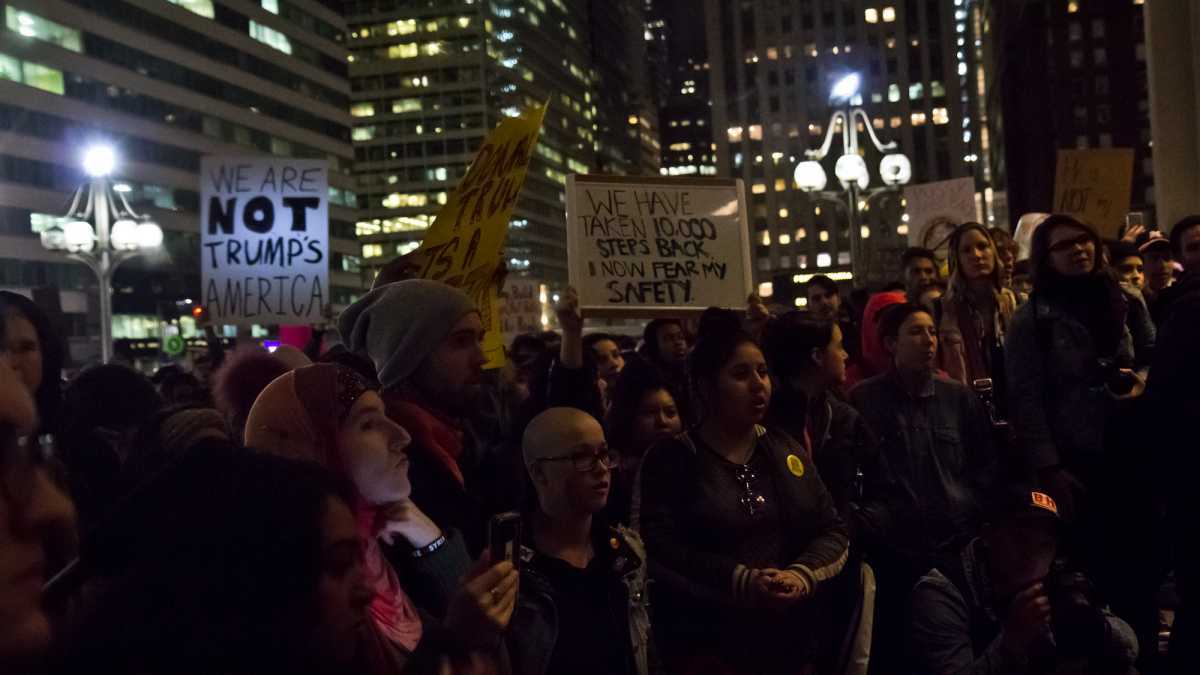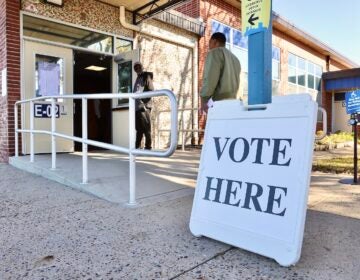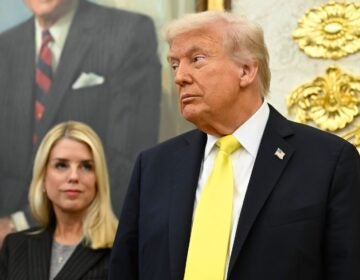Trump opponents must not fall into the bipartisan BS game

Protesters are shown at Philadelphia City Hall following the election of Donald Trump (Kimberly Paynter/WHYY)
President Donald J. Trump has investments in Saudi Arabia, Egypt, and the United Arab Emirates. That’s why they weren’t part of his immigration order, which barred people from seven Middle Eastern countries where he doesn’t conduct business.
Right? Not necessarily. Wrong? Not necessarily, either. This claim falls under a special third category, which Trump himself has turned into an art.
It’s called BS. That’s an abbreviation, of course; you know the long form.
It’s something that could be true or could be false. But the BS-er doesn’t care which is which. And that makes him worse than a liar, who believes in truth enough to knowingly and purposefully subvert it.
That was the theme of a famous 1986 essay by Princeton philosopher Harry Frankfurt, who pronounced Donald Trump a BS-er last May. As Frankfurt admitted, there was no way of knowing whether Trump believed his own campaign pledges to build a wall along the Mexican border or deport millions of illegal immigrants. But it seemed highly unlikely, given how little Trump seemed to know about the particulars of either topic.
And that was before the guy became president, unleashing a hail of rapid-fire BS unlike anything Washington, D.C. — a place known for, um, political manure — had ever seen. In his first four days in office, Trump radically inflated the size of his inaugural crowd, said he had been on the cover of Time more than anybody else, and declared that up to five million undocumented immigrants had cast ballots in the November election.
Was Trump lying? Again, we can’t know for sure. But Trump and his surrogates have made it clear that it doesn’t matter to them: Your team has your facts, Trump adviser Kellyanne Conway famously said, and our team has “alternative facts.” So nothing is really true, which is the essence of BS.
But some of Trump’s critics have engaged in their own brand of BS, too. Witness the charge that Trump’s immigration order was financially motivated, since it only targeted countries where he doesn’t do business.
In many ways Trump brought that accusation upon himself, by refusing to release his tax returns or to place his investments in a blind trust. And of course we need to continue to investigate the many possible conflicts of interest that might influence his decisions.
But the key term here is “might.” Trump doesn’t do business in Lebanon or Jordan, so far as we know, but he didn’t bar people from those countries. If his immigration order was all about his portfolio, wouldn’t we expect to see a few more nations on his list? We don’t know, and anyone who pretends otherwise is — by definition — a BS-er.
Ditto for the frequently heard Democratic charge that Russian cyberspying swung the election to Trump. That’s what Congressman John Lewis said before Trump’s inauguration, insisting that Trump was not a “legitimate president” because of Russian intercession on his behalf.
Lewis is a true national icon, a brave hero of the civil rights struggle. But his remark about Trump was BS, because he actually has no idea whether Russian spies made the difference in the election. And it echoed Trump’s own BS talking point that the election was “rigged,” which Trump somehow put aside after he won it.
Again, we need a full investigation of Russian efforts to assist Trump. And one day, we might have enough knowledge to conclude that Lewis was right. But right now, we don’t. And I bet he knows that, too.
Why does this matter? The question brings us back to Harry Frankfurt, whose essay on BS became a surprise best-seller when it was published in book form in 2005. Unlike lying, which proceeds from the assumption that something is true, BS implies that nothing is. You say human-made climate change is a hoax, and I think it’s real; you say vaccines cause autism, and I say they don’t. BS leads us to question Who’s to judge, really? It’s all relative.
Since the Cold War, relativism has been one of those weapons that conservatives have used to wail on liberals. Especially at universities, we’re told, left-leaning (and, inevitably, bearded) professors undermine God, family, and country with their insistent attacks on the ideal of truth.
But now we see that BS is fully bipartisan, seeping into every crevice of our fractured political arena. It starts at the top, with our BS-filled president. But too many of his enemies are getting in on his game, talking with confident knowledge about things they don’t know.
We can’t let that happen. Those of us who loathe Donald Trump must be extra-vigilant about avoiding BS, lest we descend into its vortex with him. The real issue for the country right now isn’t immigration, or Russia, or education, or the environment. It’s truth itself. When we give up on that, it’s game over. And Trump wins.
—
Jonathan Zimmerman teaches education and history at the University of Pennsylvania. He is the author of “Campus Politics: What Everyone Needs to Know” (Oxford University Press)
WHYY is your source for fact-based, in-depth journalism and information. As a nonprofit organization, we rely on financial support from readers like you. Please give today.




